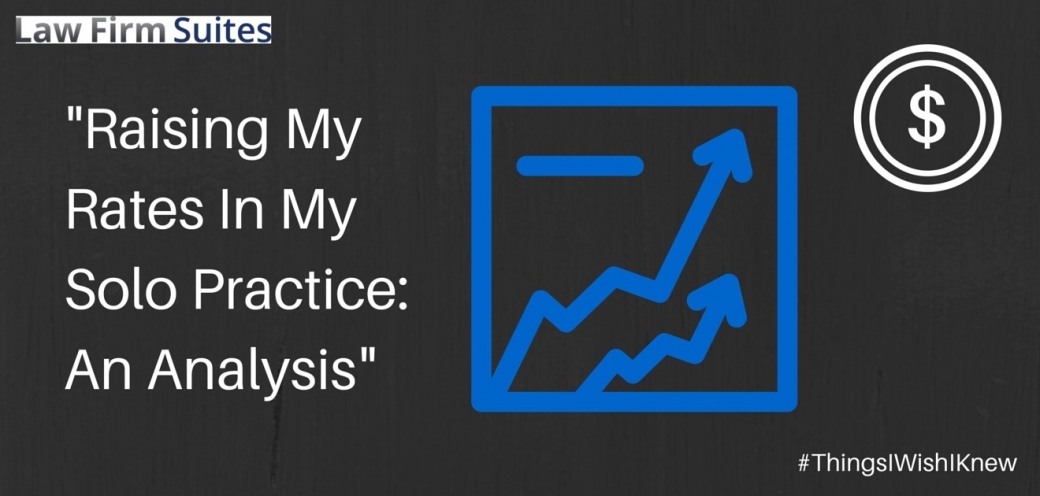In this week’s edition of Things I Wish I Knew, Joleena Louis discusses how she handled the delicate process of raising billable rate in a solo practice.
One of my goals for this year was to increase my income by 50%.
That sounds like a colossal feat, but it is definitely doable, and one way I plan to achieve that goal is to raise my hourly billable rate and initial retainer requirement.
Since starting my solo practice, I have reached the point where I don’t need to take every case that comes to me. I have grown as an attorney since I started my practice and the quality of my services has increased. I’ve also added value to my services and feel that my rates need to match the value of my work.
Anticipating problems before they arise.
One of my initial concerns was scaring away clients with my higher rates. Potential clients who may have heard of my old rates might be turned off by my new fees.
Referrals can come from a variety of places, especially from your own clients. Having your fees discussed by others is out of your control and what is being discussed may not be accurate information. A client may refer someone and the charge for a consultation may be completely different that what was discussed.
Also, current clients who have retained me for one legal issue who enter into a new retainer agreement for a different issue may find it peculiar to be paying a higher fee.
With new clients who may not know my old rates, I state my fees without explanation. If asked why my rates are so high, I explain the value and quality of services I offer and under no circumstances will I lower my rate or offer a discount.
Incidentally, every time I’ve given a discount I’ve regretted it. The clients who pay my full retainer are usually more cooperative, don’t waste time, and generally complain less.
Keeping it consistent with current clients.
I decided to not increase my hourly fees for current clients, even though my retainer agreement states that I can, with notice.
To me, it feels unfair to raise my rates at this point. Most of my client matters will come to a natural end, so eventually all my client will be on the current rate. Plus, I would hate to lose their business.
People don’t like inconsistency and changing rates mid-case would reflect poorly on me.
In the end, I think my rate increase will be beneficial for my practice. People are willing to pay more for quality and being confident in the value of my services shows the client that what they are paying is worth it.
Not only will I have an increase in profits, I’ll also be able to attract and keep my ideal client while weeding out the others.





on said:
Thanks for this helpful insight, Joleena. Your approach makes a lot of sense where you have discreet matters that will “come to a natural end.” My practice is a bit different where I serve a good portion of my clients on an ongoing basis and on multiple matters. If I’m going to raise my rates I feel that, at some point, I need to bite the bullet and do things like the big law firms – explain to clients that rates are going up due to changes in the market and the efficiencies I bring to the table after nearly 26 years of practice. I expect some may bolt for cheaper pastures but I’m hoping the smart ones will stay, recognizing my value and the fact that I haven’t raised my rates in over 5 years (show me a big law firm that can say that!).
on said:
Thanks for your comment, Steve!
on said:
Joleena,
I completely agree with your statement “Incidentally, every time I’ve given a discount I’ve regretted it. The clients who pay my full retainer are usually more cooperative, don’t waste time, and generally complain less.” On that note, I no longer give discounts as the people who ask/demand them usually don’t pay their bills, etc. I also like that you don’t raise the rates on current clients. I just make sure my current clients do not receive the new hourly fees.
Great article!
on said:
Raising my hourly rate in a solo practice was a thing I just seemed to forget about or not face as I already thought that it was hard enough on my clients paying what I was charging. Then I learned that lawyers with 20 years less experience than me were charging significantly more than I was. Then, every 8 to 12 months, my rate would increase by $50 to $75. Every client would get a letter stating that the increase would be effective on a date about 15 days in the future. All clients were billed out as of that date, unless there had been no time spent on their file since their last account and all clients were charged the new rate.
After years of huge receivables in my family law practice, the rule became “you provide to me a retainer (this varied depending on the type of matter), when you get an account, you pay it to bring up your retainer…if your initial retainer is not maintained, I don’t work on your matter”. Doing just this, ensured that I got paid immediately and I learned, fairly quickly, which clients would be a problem regarding payment. When clients realised that I was quite serious about doing nothing, bills got paid.
The other thing I learned in 30 years of practice was to bill often. Any file that had 2 hours of work on it in a month, was billed. Clients were more likely to pay smaller accounts faster. I found that waiting until the end of a step, say a court application with cross-examinations on affidavits, and then presenting a bill for $15 – $20,000 was a sure way to not get paid but 10 bills of $1500 – $2000 got paid quickly.
You also need to train a staff member to chase clients for their payments as you shouldn’t be begging to be paid. Every hour you spend bill collecting, you could be doing work that would generate more income. Further, it’s demeaning and stressful. You have worked hard to help the client and you shouldn’t be wasting expensive resources (you) when you could spend a few hours training your assistant to do that job.
on said:
Thanks so much for your insight and sharing your experience in relation to Ms. Louis’ article!
on said:
Great advice! I agree 100% about getting a retainer up front and billing often. At the last firm I worked for, I was that staff member begging clients to pay and I knew I did not want to have to do that. I may lose some potential clients with my higher retainer, but at least I know I’ll be paid and rarely have to chase any to pay.